Duduzile Zozo's funeral at the Kromvlei cemetery on the East Rand.
A party was about to start at the BP garage in Thokoza. Two brightly painted, vintage Volkswagen Beetles were parked at the petrol station, deafening house music blasting from their speakers. The passengers, members of a bridal party, were dancing, grinding their hips to the beat, screeching out the lyrics.
Two of them started kissing amid the revelry: one was wearing a calf-length, peach-pink dress and the other in a tuxedo. Everyone at the garage stopped what they were doing. They couldn’t believe their eyes. There, in middle of a petrol station in the east of Johannesburg, two women were making out.
Barely two hours earlier Ayanda Magoloza (28) and her girlfriend Nhlanhla Moremi (32) tied the knot near their home in Thokoza’s Kwanele Park. Magoloza, a “femme” lesbian, wore a cream-coloured wedding gown and Moremi, a “butch” lesbian, wore a tuxedo. Magoloza had bridesmaids and Moremi had groomsmen. It was a white wedding but, more significantly, a lesbian wedding in the middle of a public park in a township.
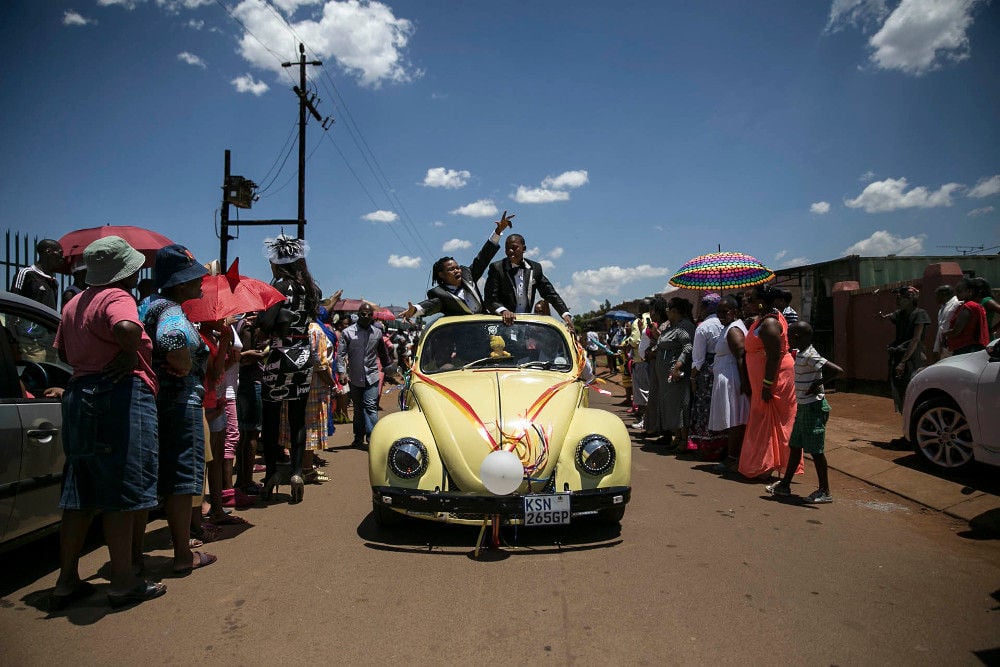
Ayanda Magoloza and Nhlanhla Moremi tie the knot. (Photos: Clarissa Sosin)
“I decided to get married at the location [township] for them to see that it’s happening,” said Magoloza, a few weeks after the wedding at her matchbox-style home where she lives with Moremi. “My wedding was an eye-opener.”
On the wall in their living room hangs a framed photograph of the pair, foreheads touching as though they are about to kiss, taken by photographer Zanele Muholi. The image was shot before they started dating but Muholi captured an intimate moment foreshadowing the relationship to come.
“We’ve got people coming to the house and saying: ‘You did a great job. Everything was beautiful. Everything was perfect.’ People we never even have a chance to speak with at the location, they were admiring everything we did. They were giving us their blessings.”
Big change
This acceptance of such open displays of homosexuality in Thokoza is a big change for a township that has seen many acts of violence against members of the LGBTI (lesbian, gay, bisexual, transgender and intersex) community.
Over the past few years, two lesbians and a gay man have been murdered because of their sexuality: Nokuthula Radebe (20) in March 2011, Frankie Twala (25) in July 2011, and, most recently, Duduzile Zozo (26) in June last year.
The deaths, of course, come along with the countless reported and unreported cases of “corrective rape” that those in the community in Thokoza face on a daily basis. But there are those like Magoloza who are fighting back.
Although South Africa is the most liberal country on the continent when it comes to LGBTI rights, traditional values still hold strong in rural areas and townships such as Thokoza.
In an article on the criminal classification of “corrective rape”, published by the Open Society Initiative for Southern Africa in its journal BUWA! The Journal on African Women’s Experiences, there have been more than 31 reported cases of “corrective rape” in South Africa that resulted in the death of the victim since 1998, with just two convictions. The number of “corrective rapes” that don’t end in death is difficult to estimate because most of them go unreported.
‘Corrective rape’
In 2011, Human Rights Watch defined “corrective rape” as “a phenomenon in which men rape people they presume or know to be lesbians in order to ‘convert’ them to heterosexuality.” (There have also been reports of men being victims of “corrective rape”.)
The report, which describes various cases of discrimination and abuse against the LGBTI community, was far from being the lone voice in demanding that the government take action.
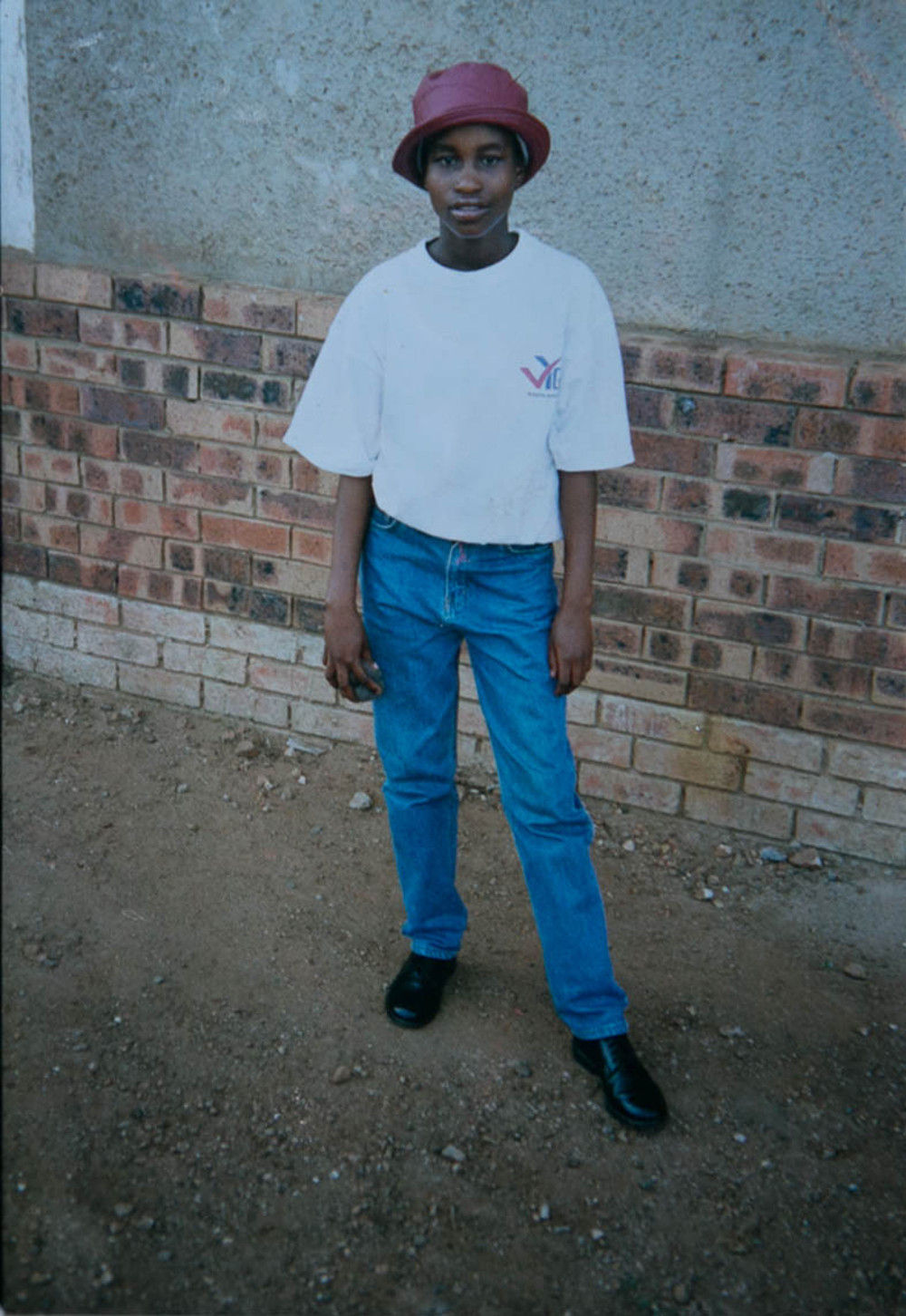
Duduzile Zozo.
Late last month it finally did. Justice Minister Jeff Radebe launched the Lesbian, Gay, Bisexual, Transgender and Intersex Programme, which promises a three-part national strategy that includes multimedia awareness programmes, the development of a database of hate crimes against LGBTI individuals and training programmes for public service officials.
Meanwhile, the community is often left to fight the battle on their own, as they have been doing for years.
LGBTI on film
For the past 11 years, Magoloza has documented the LGBTI community in Kathorus, an area that includes Thokoza, Kathlehong and Vosloorus, with her video camera. Her documentation includes footage of activist meetings, protests, speeches and the aftermath of hate crimes.
She lent me one of her memory cards and, after flipping through the louder, more lively footage, I came across some clips of a quieter scene.
On the screen was a group of women standing close together in an abandoned building holding brooms. The building was falling apart; rubble and trash covered the floor. Magoloza’s voice came from behind the camera. She spoke about Nokuthula Radebe, whose lifeless body had been found in that very room on March 28 2012 by two playing children. The women were holding a memorial service for this young lesbian, who had been raped and murdered. They then cleaned the building in her honour.
“When I heard that Nokuthula died I went there too, for her memorial service, to clean the space,” says Magoloza. It was the day before her funeral … I just took my camera and went there. We shot [the scene]; you can even see blood stains. They were still there, you know? Things that they used to kill her were still there. We needed to clean that space and make sure that that memory has been wiped away from the family.”
Magoloza had her camera with her as well on June 30 last year, the day that Duduzile Zozo’s body was found. Arriving at the scene she saw Zozo’s naked body lying in a neighbour’s front yard. She had been raped and strangled; a toilet brush had been shoved inside her vagina.
“I found her sister coming from identifying the body. She was screaming all the way from the house to that distance but then she fainted,” said Magoloza. “The mother was there, too; she could not believe this was happening.”
After seeing her daughter’s corpse, Zozo’s mother, Thuziwe Zozo, turned and walked away. She was too shocked even to cry.
All too much
That was one scene Magoloza would not capture. She couldn’t bring herself to turn on her camera. Even though she hadn’t known Zozo personally, it was all too much for her.
Twenty-seven-year-old Bianca Laban was also there the day that Zozo’s body was discovered. Best friends, the two had gone out drinking at Lizzy’s Inn, a local tavern known as a safe place for LGBTIs. Zozo wanted to go home early that night, so Laban walked her part of the way before returning to the tavern.
Around four that morning, Laban, drunk and exhausted, received a phone call from a private number. The voice on the line said: “Your friend died”, and then the phone went dead. A little while later the same person called again, this time saying: “Go to Lucky’s house. Your friend Duduzile died. She’s there.”
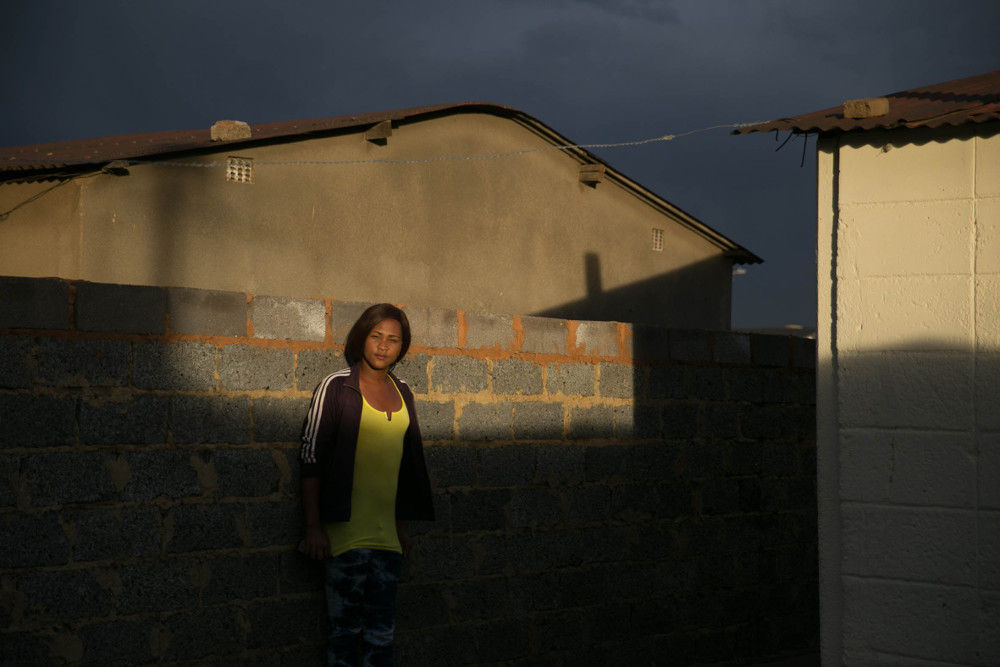
Bianca Laban was gang raped by seven men.
Laban was one of the first people to call the police to report the murder. She called them in the morning, but the police did not arrive to investigate or retrieve the body until that night.
Laban is a transgender woman. Born a boy, she has identified as a woman for most of her life. Growing up she wore dresses to school, never trousers. Tall and thin, Laban is rarely found without high heels, long painted nails and impeccable make-up. She is well known in the neighbourhood, greeting nearly everyone with a hug and a long, dragged-out “Daaahling”.
But her notoriety hasn’t kept her safe. In 2003 Laban was gang-raped by seven men. She and her mother went to the police station afterwards to report the rape, but instead of being reassured that the men would be arrested, Laban was ridiculed and sent away in shame.
Zozo is not her first friend to be murdered, either.
No police action
In July 2011, Frankie Twala was beaten to death, allegedly by the boyfriend of a female friend outside the My Springs Tavern. His friend reported the murder to the police, accusing her boyfriend of the murder but, according to Laban, the police never followed up on the case.
Radebe’s murderers were never caught and the case has come to a standstill. Twala’s family eventually moved to Johannesburg because they could not stand to see his murderer walking freely through the streets of Thokoza.
Laban, meanwhile, sees the men who raped her on a regular basis. One day when I picked her up on her way to meet a friend, another lesbian who had been raped, she told me how she had just met one of her rapists on the street; he had asked for a hug.
“Gays and lesbians have been killed like chickens and no one is acting against that,” said Laban during an interview last year. Since Zozo’s murder, she has taken a prominent role in fighting for the rights of the LGBTI community of Thokoza by speaking out against the inaction of the police.
“I’m not going to just fight for Duduzile only. I’m going to make sure that they’ve got all the killers who killed our sisters and brothers as gays and lesbians.”
Police response
Because of her distrust of the police, Laban began going to the police station on a regular basis to check on the Zozo case, but she felt her presence wasn’t appreciated and that the police were evasive.
When I mentioned to Magoloza that I needed to speak with the police about the case, she told me: “If they see you with Bianca they’re going to just run away or just, you know, swat at you guys and tell you all this nonsense.”
The lack of justice seems to be, at least in part, because the authorities that should be helping them are not.
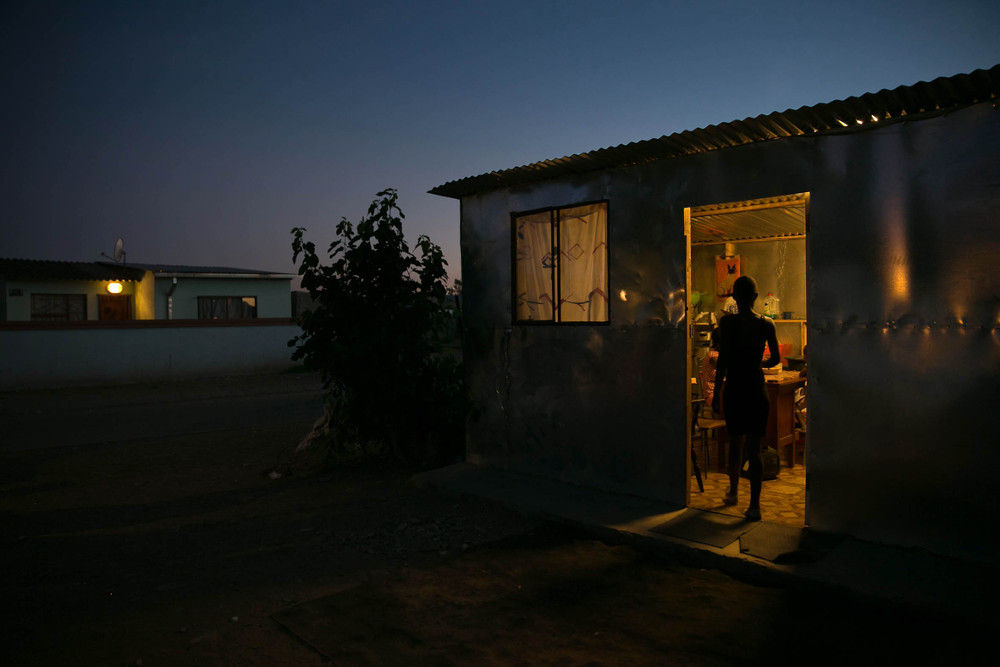
Duduzile Zozo was raped and strangled near her home, where her family still live.
Last year in July – a month after Zozo’s murder – the minister of women, children and people with disabilities, Lulama Xingwana, along with members of the United Nations, visited Thokoza.
It was Orange Day, an internationally recognised day on the 25th of every month devoted to ending violence against women. Xingwana visited the shack that Zozo grew up in, bringing the family groceries and assuring her mother that the case was making progress. She then met with the officers assigned to the case, as well as with Laban and members of the LGBTI community.
Community action
Members of the media waited in the hallway while Xingwana, UN representatives, the investigating officers, Laban, members from activist groups such as the Forum for the Empowerment of Women, Ekurhuleni Pride Organising Committee, IHawu and Iranti-Org, a queer, visual-media nongovernmental organisation that focuses on LGBTI issues throughout Africa, and Inkanyiso, a blog about LGBTI issues in South Africa, discussed the situation in Thokoza.
The meeting lasted about 30 minutes and the LGBTI community expressed its fury over the slow police response after Zozo’s murder and with the lack of justice for victims of hate crimes in general. They wanted to know why the minister suddenly seemed to care about their situation and what she was going to do to change it.
“We will work together with the police to fight rape and help the Zozo family to get the justice they deserve,” Xingwana said. “We have policies in place, but all we need is to change the mind-sets of people, and then implementation will not be a problem.”
Easier said than done. Besides, it’s not just the mind-sets of the people that need to change; the mind-sets of those who are meant to protect them need to change as well.
Three months after Xingwana’s visit to Thokoza, I met with Captain Johannes Mbeka, an officer assigned to the Zozo case, in the police station on Khumalo Street. He showed me Zozo’s file, which is as thick as a textbook. He assured me that her murder was being treated “like a priority case”. I also him asked about the status of Radebe’s case. At first he didn’t recognise her name but later on in our interview he discovered that her thin file was right on his desk.
Sexuality ‘of no importance’
When asked about the role Zozo’s sexuality played in her murder, Mbeka said that it was of no importance to the investigation, adding that the police did not believe she was “correctively” raped or targeted because she was a lesbian. He said the LGBTI community doesn’t really face any dangers at all. When asked why, then, there was a palpable fear throughout the community, he said it was all a show for the media, especially in Laban’s case.
On October 18, nearly three months after Zozo’s body was found, police arrested Lekgoa Lesley Motleleng for her rape and murder. Motleleng, 22, was her neighbour – he lived one street away and even attended the candlelight vigil held in her honour just days after her death. His arrest was completely unexpected, but it took a huge weight off the family’s shoulders.
“It’s better now we have found the criminal,” said Zozo’s mother, Thuziwe, who, with some help from the community, was finally able to move from an old shack into a newer one down the road.
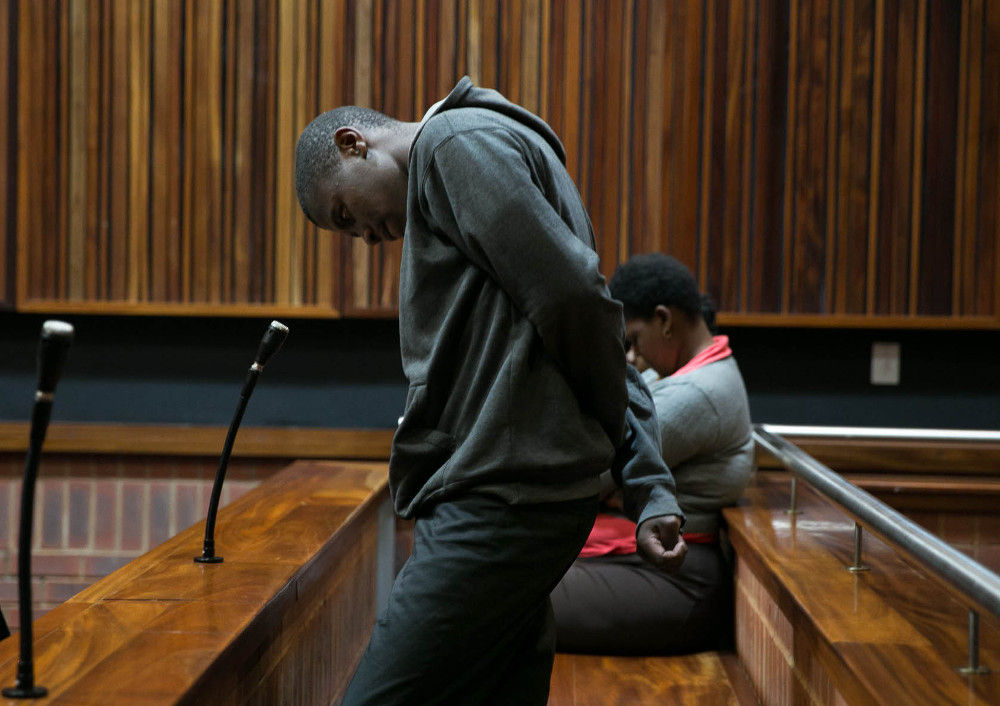
Lekgoa Lesley Motleleng attends a bail hearing at the Palm Ridge magistrate’s court for the rape and murder of Duduzile Zozo.
She and her family still live a block away from where Zozo’s body was found but they are no longer forced to look at the yard every day. The old shack has been demolished, and there is now a patch of dirt where it used to stand, between the main house and a dog kennel.
Motleleng’s first court appearance was at the Palm Ridge magistrate’s court on October 21 last year where he did not ask for bail and his case was postponed. The gallery was so crowded that people were watching from outside the courtroom through the window in the door; LGBTI activists from all over Gauteng stood outside the courthouse singing protest songs. Laban stood at the front of the courtroom alongside Thuziwe Zozo; they had the best spot to look Duduzile’s killer in the face.
Since then, Motleleng has been brought to court numerous times and each time his case has been postponed. But his trial has finally been scheduled to begin on May 26.
Waning public interest
With each court date the number of people who show up to support the Zozo family steadily diminishes. Duduzile’s case initially attracted a lot of media attention but since then that attention has waned.
Sure, Magoloza had a public and very lavish wedding and, yes, Laban freely walks the streets in beautiful high heels and a long weave, but they are exceptions to the rule. There is still no justice for the Radebe and the Twala families, nor for the countless cases of “corrective rape” and violence that go unreported.
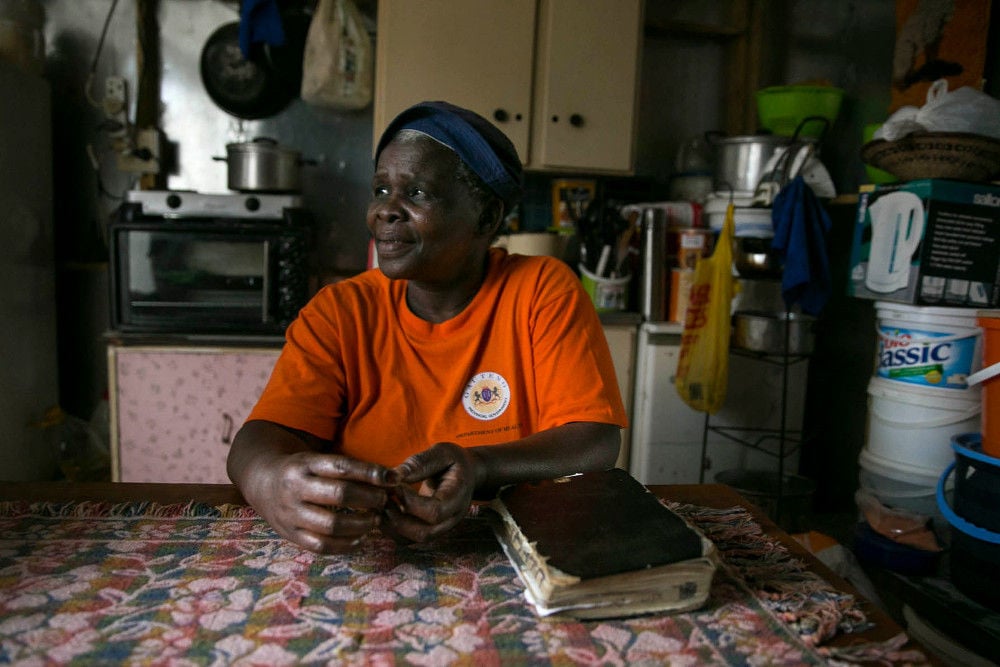
Thuziwe Zozo, Duduzile’s mother, turns to her Bible to seek comfort in the wake of her daughter’s murder.
Meanwhile, Thuziwe Zozo keeps her Bible close. It is nearly 20 years old, it is well worn and has ZOZO written in big letters down the cracked spine. Inside its pages are her most precious objects: the last two images of her daughter that she has. She used to have more – Duduzile loved to be photographed and would pose constantly – but she’s not sure where they are any more.
Thuziwe flips to her favourite passage, John 14:1, to find some solace. She reads aloud: “Do not let your heart be troubled …”